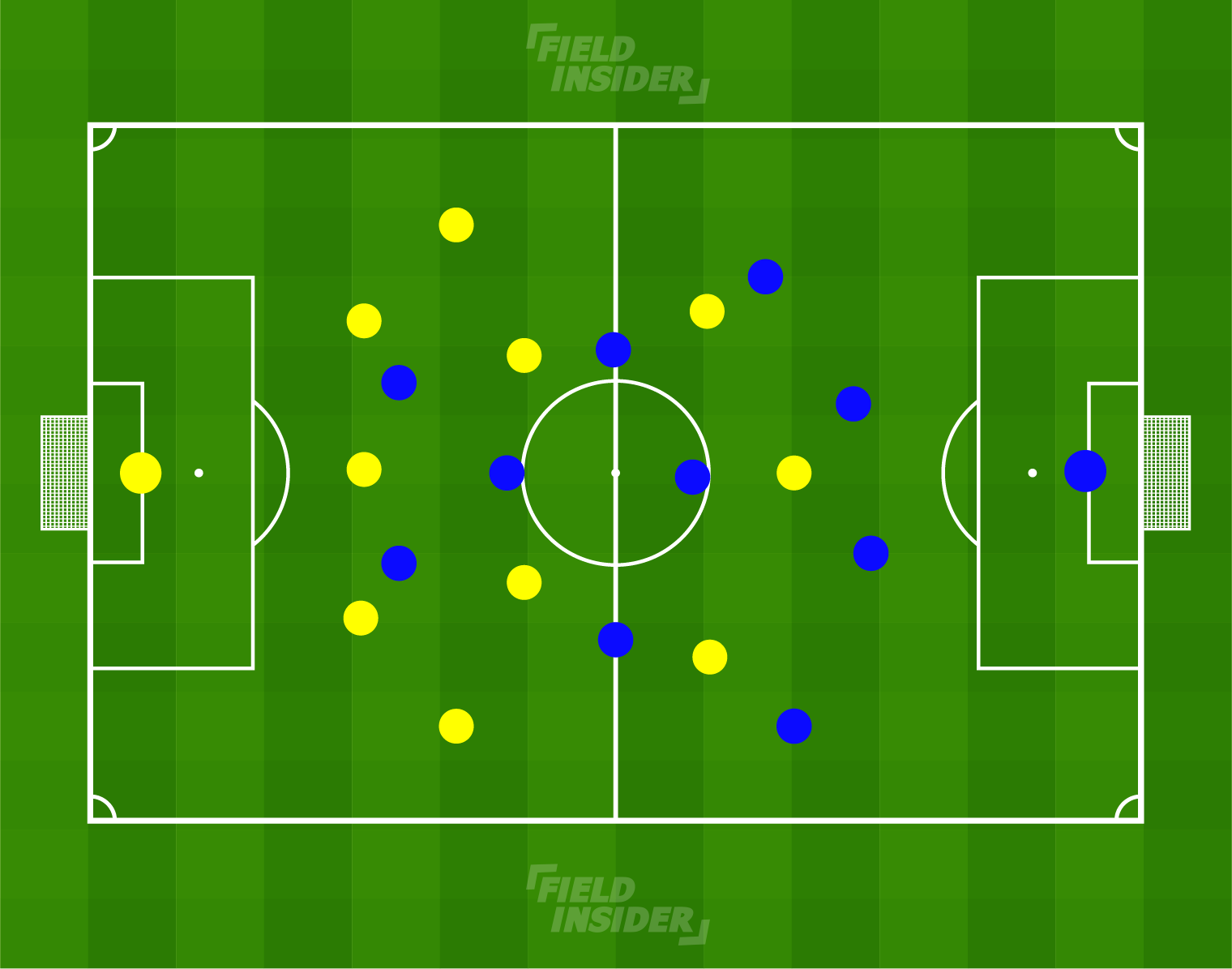How to Assemble a Football(Soccer) Team | Complete Guide
There are several steps to bear in mind when carrying out a team analysis.
Every age group of youngsters have its strengths and weaknesses, advantages and disadvantages. It is important to understand the capabilities and needs of every group and its members, as that is the only way to create sessions that will improve their abilities.
Understanding your Players

When it comes to youth players, the main advantage is that they are curious and listen very carefully. Football plays a big role in raising children, so children acquire healthy habits and rules of behaviour on and off the field. However, working with this age has certain disadvantages.
A very small number of exercises can be interesting for children. Dribbling with friends, shots on goal, games of a fun nature are the ones that children can keep their attention on.
Although the children have a lot of respect for the coach, there will always be a question when football will be played. Children at this age lose concentration quickly, get tired sooner and often need a short break.
This is one example which shows how important it is to understand the players you have at your disposal and to implement proper analysis in a team. As a coach, you should develop a proper monitoring system. This system should provide you adequate information regarding players’ performance during training sessions, as well as their behaviour.
Gathered data will show you players’ progress during time and is their development going according to the training plan. Proper team analysis will supply you with all necessary facts about your players. Proper analysis can be done with the use of SWOT analysis methods.
What is a SWOT Analysis?
SWOT Analysis is a useful technique for better understanding a team’s strengths and weaknesses, as well as detecting opportunities and the threats. A SWOT analysis would be a useful tool as it will allow you to evaluate your team and identify your advantages, disadvantages and opportunities to grow.
This type of analysis will show information about the factors that have great influence on your team’s performance, both in training sessions and in competitive matches. This is a powerful analytic tool and is used by many clubs. Beauty of this analysis is universal character. It can be used for any age group or individual in a team.
Analysis of the Players
This kind of information will allow you to separate strengths and weaknesses of each of your players. Understanding these characteristics will benefit both you and the players. This sort of analysis will show the strengths and weak spots of each individual of your team. Such information will provide better planning of training sessions, especially when it comes to individual training sessions.
This will allow you to focus your and players’ energy on drills that will get the best out of them. When you know each player’s strengths, you can further work on their improvement in order to exploit them in a game. Also, knowing their weaknesses will be a clear signal to you what aspects of the game each player needs to work on, in order to minimise or even eliminate weak spots of his play.
Another benefit of team analysis is better compatibility between your tactical ideas and strategies, and your players’ capabilities. There is no much point in designing and visioning tactics for the game, if you do not have resources to make it happen.
If you have a high level of understanding of your players’ abilities, then you can decide which players fit with your tactical approach. This way you will know which players are available to you to put your idea into action. Also, after conducting team analysis, you can pick the best formation and tactics with less uncertainty.
Picking Tactics/Formations using Player Analysis
You will tend to pick tactics that are focused on your team’s strengths, not weaknesses. If you have fast players, you will try to impose a high tempo of the game and look for a cross play. When your players are rather short, you will force a short passing game, without long passes. If you have more power up front, you will tend to adopt more offensive football philosophy.
If your strength is in the back line, you will play defensive football and look for your chance from set pieces or from counter attacks. These are all potential options for you to choose when deciding on tactics and formation. What will be the end result, depends on available players and their strengths and weaknesses.

What are Areas you should Analyse for Strengths/Weaknesses?
- Passing (speed, strength, accuracy)
- Shooting (accuracy and strength)
- Running (top speed, first step)
- Jumping (height, header)
- Endurance and stamina
- Other attributes (such as play awareness, teamwork, etc.)
What does Player Analysis look like?
The simplest way is to put the strengths and weaknesses on the piece of paper or flipchart. For example, if analysing a defender, it would look something like this:
- Strengths:
- Great jumping ability
- Strong and durable
- Good passing skills
- Good communication with other players
- Expert in tight marking
- Weaknesses:
- Stubborn
- Aggressive
If you look at the information above, you can easily detect areas that are favourable and should be developed further. You can conclude that you have a player that can follow the opponent’s attackers easily around and win a duel game with them.
Good jumping skill would be useful in both defensive and offensive set pieces and it creates an opportunity for you as a coach to create tactics for these situations in order to get advantage in a competitive game.
On the other hand, if you take a look at the weaknesses, you see that we are dealing with aggressive players, which means he is inclined to make rush tackles and fouls.
This may result in yellow or red cards, free kicks in a danger area close to goal, or even a penalty for the opposing team. All of these must be taken into account when creating tactics and you should find a way to work on these shortcomings during training sessions.
Importance of Coaching Staff Abilities
It is not just the case with players. You should be aware of the capabilities of your own coaching staff members. They are also a part of the team and have an essential role in players’ development.
Understanding the qualities of your staff members is important for planning the further improvement of skills of your players. By knowing which areas of coaching your team members need to improve, you can plan training sessions more effectively.
You will look to harvest the qualities of your coaches and force the drills they can perform at top level. Also, you will tend to avoid exercises of lesser quality and drills your coaches do not have appropriate levels of knowledge.
Analysis of a team is essential for better understanding of your team possibilities and chances for improvement and success. If you lack a quality coach for a skill that is a crucial part of your tactics, you will find a way to upgrade your staff abilities.
You can hire a new coach, or you can send some of your coaches to a course or additional education. Team analysis is necessary for detecting weak spots of your coaching staff.
What does Coaching Staff Analysis look like?
If you are evaluating your goalkeeper coach, analysis would be as follows:
- Strengths:
- Good coaching experience
- Retired goalkeeper himself (for example, Dida is now the First Team GK Coach for AC Milan)
- Played in top league
- Good communication with players
- Expert in one-on-one situations
- Weaknesses:
- Lack of discipline
- Poor judgment when it comes to set pieces
After this analysis you can detect areas that need to be improved and areas that are currently creating value for your team.
Conclusion
Team analysis is a complex task and requires cooperation between the head coach and the rest of the team. It is an essential part of developing young talents and also when it comes to working with professional players.
Quality team analysis of strengths and weaknesses, advantages and disadvantages of your players and staff members will provide much clearer insight of opportunities for further growth and development.
You should always look for a room for improvement and to encourage all your team members to adopt this method and sometimes do self-analysis, with help of teammates or staff, so they can focus on upgrading their abilities.
Communication here is also a critical part of analysis. All the information gathered should be communicated with the rest of the staff, because teamwork is required for success.
Coaches and the rest of the staff should exchange opinions and advice, so the entire team can together work on enhancing the strengths and overcome weaknesses.








